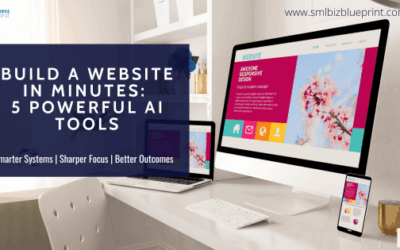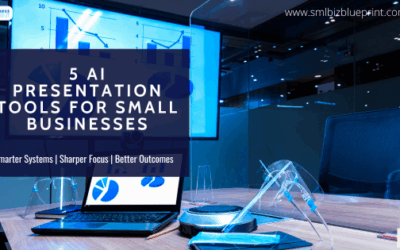Small businesses face the constant challenge of staying competitive and relevant.
As a critical player in this ongoing transformation, Artificial Intelligence (AI) has emerged as a pivotal tool for large corporations and nimble small businesses looking to enhance their content creation strategies.
This post delves into how small businesses can leverage AI to dramatically improve the efficiency and quality of their blog and video content.
We will explore various AI tools that simplify and expedite the content creation process, from automating routine tasks to generating creative content ideas.
Whether you’re drafting blog posts, producing videos, or looking to scale your content output without compromising quality, AI offers a suite of possibilities to streamline operations and foster growth.

#1 Understanding AI in Content Creation
Artificial Intelligence, or AI, has transcended its origins as a niche technology to become a cornerstone of modern digital strategies, particularly content creation.
For small businesses, understanding what AI can offer is the first step towards harnessing its potential to transform their content development processes.
What is AI, and How Does It Apply to Content Creation?
At its core, AI involves using machines or software to perform tasks that typically require human intelligence. These tasks include learning from examples (machine learning), understanding natural language (natural language processing), and generating content (generative AI).
AI can automate repetitive tasks, suggest improvements, and generate readable, engaging content based on set parameters in content creation.
Types of AI Tools for Small Businesses
For small enterprises venturing into AI-assisted content creation, several types of tools are beneficial:
Generative AI tools: These tools help generate ideas, write drafts, and even create entire articles based on a few input keywords.
Transcription tools: Perfect for converting video and audio content into text, these tools are invaluable for creating blogs, social media posts, and other written content from spoken-word materials.
AI-driven analytics: These tools analyse user engagement and behaviour, providing insights to guide content strategy and optimisation.
Why Should Small Businesses Care?
The integration of AI into content creation allows small businesses to:
Scale content production without a corresponding increase in resources.
Enhance the relevance and personalisation of content, which is crucial for engaging modern audiences.
Improve SEO by generating keyword-rich content that aligns with current best practices, making it easier for potential customers to find you online.
In summary, AI is not just a technological advancement; it’s a transformative tool that can redefine how small businesses create and manage content.
By understanding and integrating AI tools into their operations, small businesses can keep up with industry trends and set new standards for efficiency and creativity.
#2 Benefits of AI for Small Businesses
Incorporating Artificial Intelligence (AI) into content creation yields numerous benefits that can significantly enhance small businesses’ operational efficiency and content quality.
Here, we explore how AI can be a game changer in managing and scaling content production.
Time-Saving through Automation
One of the most immediate benefits of using AI in content creation is its substantial time savings. AI can automate repetitive tasks such as data collection, initial content drafting, and basic editing.
For instance, AI-powered tools like ChatGPT can generate first drafts of blog posts or marketing copy within minutes, reducing the burden on content teams and allowing them to focus on more strategic tasks.
Enhancing Content Quality
AI speeds up the creation process and helps improve the quality of content. Tools like Grammarly use AI to review spelling, grammar, and style, making suggestions that enhance readability and effectiveness.
Additionally, AI can analyse user engagement data to suggest content adjustments that better resonate with audiences, ensuring the content reads well and performs well in user engagement.
Scalability of Content Production
AI provides a viable solution for small businesses to expand their reach without proportionately increasing their budget. Businesses can produce more content faster by streamlining the creation process and automating parts of the content pipeline.
This scalability is crucial for maintaining a presence in multiple channels and keeping up with the content demands of modern digital marketing.
Increased Personalization
AI excels at handling large data sets, enabling it to tailor content to individual preferences. By analysing user behaviour and preferences, AI tools can help small businesses create highly personalised content strategies.
This level of personalisation is often associated with higher engagement rates, as content that resonates personally with users is more likely to be consumed and shared.
SEO Optimization
AI tools are equipped to follow the latest SEO guidelines and can suggest keywords, meta descriptions, and optimised content structures for search engines. By using AI to ensure that content is SEO-friendly, small businesses can improve their organic search rankings and visibility, essential for attracting new customers.
In conclusion, AI’s benefits in content creation are transformative. It allows small businesses to produce high-quality, engaging, and personalized content at scale.
As the digital landscape becomes more competitive, AI tools provide a critical advantage by enhancing efficiency and ensuring that content efforts align closely with business goals.

#3 Implementing AI in Blog Content
Understanding how to integrate AI-powered tools effectively into the content creation process is vital for small business owners looking to elevate their blog content.
This section provides a practical guide to utilising AI for blogging, from ideation to publication.
Tools for Brainstorming and Topic Generation
The first step in creating engaging blog content is often generating compelling topics.
AI tools can provide ideas based on current trends and SEO data, ensuring topics are exciting and likely to perform well in search rankings. By inputting a few key terms related to your business, these tools can suggest a list of potential blog posts that align with what your audience is searching for.
AI-driven Research Tools
Once a topic is selected, gathering the necessary information can be time-consuming. AI-driven research tools can expedite this process by pulling the latest data, studies, and sources from across the web.
Tools like Evernote Web Clipper and Feedly use AI to curate and organise content related to your topics, making it easier to gather and synthesise information that can be transformed into detailed, informative blog posts.
Using AI for Drafting and Refining Blog Posts
With the topic and research in hand, the next step is to draft the content. AI writing assistants like Jasper (formerly Jarvis) or Writesonic can help create initial drafts or sections of content.
These platforms use natural language processing to generate coherent and contextually appropriate text, providing a solid foundation that you can then refine and personalise.
Enhancing Readability and SEO
The final step before publication involves refining the content for readability and SEO.
AI tools like Grammarly or Hemingway Editor assess the readability of your text, suggest grammar corrections and help simplify complex sentences, making the content more accessible to a broader audience.
Additionally, AI-powered SEO tools such as Clearscope or MarketMuse recommend keyword usage, content structure, and other elements critical for search engine optimisation.
Maintaining a Human Touch
While AI tools are compelling for enhancing efficiency and productivity, infusing the final content with a personal touch is crucial. This means reviewing the AI-generated draft to ensure it matches your brand’s voice and ethos and making necessary adjustments to reflect your unique perspective and insights.
Incorporating AI into your blogging strategy streamlines the creation process and enhances the quality and impact of your content. By leveraging AI for the mechanical and creative aspects of blogging, small businesses can produce consistently compelling content that captures and retains audience interest.
#4 Enhancing Video Content with AI
Video content has become a staple in digital marketing due to its high engagement rates and effectiveness in conveying messages.
For small businesses, AI offers numerous ways to enhance video production, making it more accessible, efficient, and impactful. Here’s how you can leverage AI to boost your video content creation.
AI Tools for Scripting and Storyboarding
Creating a compelling script and storyboard is the foundation of any great video. AI tools like Plotagon or Celtx use machine learning to help generate scripts based on input themes or dialogue.
These tools can also assist in laying out the visual flow of the story, ensuring that the narrative structure is engaging and coherent.
Using AI for Editing and Post-production Enhancements
Once the video is shot, the editing process begins. AI-powered video editing tools such as Magisto or Adobe Premiere Pro use AI to automate many aspects of video editing.
These tools can analyse footage for the best shots, suggest edits, and even apply colour correction automatically, significantly reducing the time and expertise required for post-production.
Generating Captions and Subtitles
Accessibility is crucial, and captions are essential for making video content accessible to a broader audience, including hearing impaired or watching videos without sound.
AI tools like Descript or Rev offer automated captioning services that quickly generate accurate subtitles, making your content more inclusive and increasing its reach.
Optimising Video for Different Platforms
Different social platforms favour different video formats and styles. AI tools can help you tailor your video content for various channels to maximise engagement.
For example, Lumen5 is an AI tool that can repurpose existing content into videos optimised for social media, ensuring that the videos meet platform-specific requirements and audience preferences.
Ensuring Consistency and Quality
Maintaining a consistent quality and style across your videos strengthens your brand’s identity. AI can analyse your existing videos and suggest adjustments to ensure consistency in visual elements, tone, and pacing across all content.
This level of detail enhances brand recognition and viewer retention.
In conclusion, integrating AI into your video production process can transform how you produce content, from the initial scripting to the final editing touches.
These tools simplify complex processes and ensure your videos are polished, professional, and primed to capture the audience’s attention.

#5 Ethical Considerations and Best Practices
As small businesses integrate Artificial Intelligence (AI) into their content creation processes, maintaining ethical standards and adopting best practices are paramount.
Here’s how to responsibly leverage AI while keeping your content genuine and trustworthy.
Transparency with Your Audience
Honesty is crucial when using AI in content creation. Businesses should disclose AI involvement in their content. This transparency builds trust with your audience, showing that while you use AI tools to enhance efficiency and effectiveness, you are also committed to maintaining authenticity in your communications.
Maintaining Human Oversight
AI is powerful but not infallible. It requires human oversight to ensure that the output aligns with your brand’s values and the quality standards you uphold. Small businesses should review and refine AI-generated content before publication, ensuring each piece resonates with your audience’s expectations and your brand’s voice.
Avoiding Over-reliance on AI
While AI can significantly enhance content creation, it should not replace human creativity and decision-making. Use AI to augment your creative processes rather than as a substitute.
Ensuring that the core ideas and final edits come from humans helps maintain the unique aspects of your brand that connect with customers.
Fact-checking and Accuracy
AI-generated content can occasionally include errors or outdated information. Fact-checking and verifying all AI-produced content against credible sources is crucial before publishing. This prevents the spread of misinformation and reinforces your business’s reputation as a reliable source of information.
Adhering to SEO and Data Privacy Regulations
When using AI tools that handle data, such as analytics or personalised content suggestions, ensure compliance with SEO best practices and data privacy laws.
Understanding and adhering to these regulations protects your business and respects your audience’s privacy.
Best Practices for Implementing AI
Start Small: Integrate AI into one segment of your content production to understand its impacts and learn how to manage its integration smoothly.
Continuous Learning and Adaptation: Stay informed about the latest AI advancements and updates to keep your content creation processes modern and efficient.
Feedback Loops: Regularly solicit feedback from your audience and your team on the AI-generated content. Use this feedback to improve and adapt your strategies.
By following these ethical guidelines and best practices, small businesses can effectively and responsibly integrate AI into their content creation workflows.
This enhances operational efficiency and helps maintain the integrity and authenticity critical to building lasting relationships with their audience.
Conclusion
Embracing Artificial Intelligence (AI) in content creation offers small businesses a remarkable opportunity to boost efficiency, enhance the quality of their content, and engage more effectively with their audience.
Throughout this blog post, we’ve explored how AI can transform how small businesses approach content creation—from automating mundane tasks and generating ideas to improving SEO and ensuring content consistency across platforms.
Recap of Key Benefits:
Time Efficiency: AI tools streamline content creation processes, saving valuable time that can be redirected to strategic tasks.
Quality Enhancement: AI aids in refining the accuracy, readability, and overall appeal of content, whether it’s through grammar correction, style enhancement, or targeted SEO practices.
Scalability and Personalization: AI allows small businesses to scale their content output without significantly increasing resources and to tailor content to meet their audience’s unique needs and preferences.
Ethical Considerations: As we integrate these advanced tools, it’s crucial to maintain transparency with your audience about AI’s role in your content strategy and to ensure that AI assists rather than replaces the human touch that embodies your brand’s essence.
As we move forward, small businesses must continue to explore and integrate AI technologies thoughtfully and creatively to stay competitive in a digital-first world.
AI’s potential in content creation is vast, but it requires a balanced approach that respects both technological capabilities and the genuine human connections that define your brand.
We encourage you to start small—pick one aspect of your content creation process that could benefit from AI and test some tools.
Share your experiences and insights with us, and let us know how AI is improving your workflows.
Are you ready to transform your content creation strategy with AI?
Dive in, experiment, and harness AI’s power to meet and exceed your content goals.
FAQs
Q1. What are the primary benefits of using AI in content creation for small businesses?
A1: AI significantly enhances efficiency by automating repetitive tasks, improves content quality with editing and SEO tools, and enables scalability by allowing businesses to produce more content faster.
Q2. How can AI help small businesses save time in content creation?
A2: AI tools can automate tasks such as data collection, initial drafting, and basic editing, significantly reducing the time required for content production and allowing creators to focus on strategy and design.
A3. What types of AI tools are available to enhance blog content?
Q3: AI offers a range of tools, including idea generators, research assistants, writing assistants like Jasper, and SEO enhancement tools like MarketMuse, which help in various stages of blog content creation, from ideation to publication.
Q4. Can AI improve the quality of video content for small businesses?
A4: Yes, AI can automate aspects of video production such as scripting, editing, and captioning, which not only speeds up the process but also ensures high-quality, engaging content with consistent style and tone.
Q5. How should small businesses approach the ethical use of AI in content creation?
A5: Transparency about using AI, maintaining human oversight, and ensuring content accuracy are vital ethical considerations. Using AI as an assistive tool rather than replacing human creativity is essential.
Q6. What are some best practices for integrating AI into small business content strategies?
A6: Start with a specific use case, monitor results and adapt as needed, balance AI-generated and human-crafted content, and ensure AI outputs align with your brand values and voice.
Q7. Are there any risks associated with using AI for content creation?
A7: Potential risks include over-reliance on AI, which might lead to a loss of authenticity in content, and the possibility of generating inaccurate or biased content if it needs to be appropriately supervised and fact-checked.
Other Articles
Guide to Conquering AI Integration Challenges For Small Businesses
A Strategic Guide to Prioritizing AI Initiatives for Small Business Success
Understanding ChatGPT, CustomGPTs, and Agents: A Guide for Small Businesses




